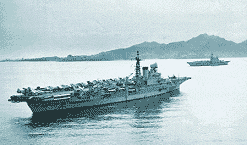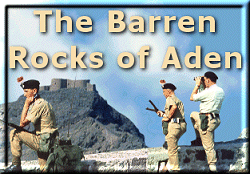Victorious & Hermes at Aden
By Dave Morris
Leading Radio Operator (Tactical) HMS Victorious 1966-1967

HMS Victorious
In May 1967, HMS Victorious was coming to the end of the Far East foreign leg of a general service commission. We were looking forward to heading west from the Singapore area to rendezvous with HMS Hermes in the area of Gan. She was to take over the role of Far East strike carrier, fleet flagship and fleet cocktail party ship.
However, we were ordered to leave the Singapore area early and proceed with all speed to rendezvous with Hermes off Aden. We understood that the two carriers were to be used to support shore activities in Aden - frighten the natives with fire and air power.
Surprisingly enough they allowed us ashore in Aden to play football, but it was like nothing I had participated in before. As the boat deposited us at the jetty, we were met by an armed escort and loaded onto an armoured bus. High-rise blocks of flats overlooked the football pitch and armed guards patrolled the touchlines.
My wife informed me later that there had been reports on British radio of casualties and fatalities in Aden at this time, which caused some consternation.
Our main concern, at this time, was to get home on the programmed date as many of the ship's company had friends and family who had made arrangements to travel to and stay in Portsmouth to greet the ship after 12 months away. My wife was one of them.
As time went on we became more anxious but eventually we were released from Aden on the last possible date to meet our original date of arrival back in the UK. We steamed up the Red Sea but of course as we transited the Suez Canal, we witnessed the massive military build up on the banks either side.
We were the next to the last RN ship to transit the Canal and had not got far into the Mediterranean when the Six-Day War broke out. Not surprisingly, we were diverted to Malta to await further instructions. On sailing from Malta for independent exercising in the area, we were met by a squadron of Soviet minesweepers. They struggled to keep up with us when we proceeded at flying speed and a Soviet destroyer eventually relieved them. This also had problems keeping up with us and turned down our offer of fresh bread.
Our presence in the Med at this time caused some argument. After the war was over the Egyptians claimed that British carrier-borne fixed wing aircraft had been used against them on the side of the Israelis and there were questions asked in the House of Commons. To disprove the Egyptian allegations, copies of our Daily Flying Programmes were sent to MOD. Don't ask me if they were authentic.
We were of course late getting back to the UK.
Coincidentally, 9 years later, I was on one of the ships (HMS Glamorgan) of the first RN group to pass through the Suez Canal after it reopened. This was with Deployment Group 3 - Task Group 317.3 - CTG Rear Admiral John Fieldhouse.



